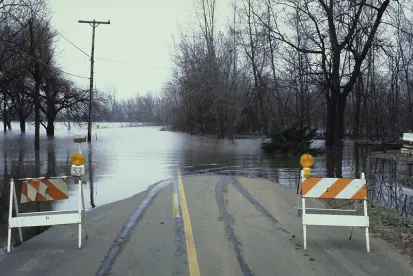While Hurricane Harvey will be remembered in the Texas Coastal Bend area for its punishing high winds, it is the days of rainfall and the historic flooding that will make Harvey the most destructive and expensive natural disaster ever to hit the mainland United States. It is estimated that Harvey dumped more than 24 trillion gallons of water on Texas and Louisiana between its approach on August 25 and its movement up the Mississippi River Valley and out of Louisiana. That number is almost impossible to comprehend, but the Washington Post compared it to piling up that amount of water on Washington D.C., an area of 68 square miles, and noted the water level would reach above 1,400 feet, almost as high as the Empire State Building. It exceeds the capacity of the entire Chesapeake Bay.
Virtually every river, stream and bayou in southeast Texas experienced historic levels of flooding and flooding is still occurring in Southeast Texas. Several flood control reservoirs filled beyond capacity, flooding homes behind them and, as they release water downstream, flooding even more homes and parts of downtown Houston. According to the most recently available information, at least 30,000 homes have been completely destroyed and another 70,000 have suffered extensive damage. The City of Beaumont’s water utility system was disabled. More than 500,000 automobiles were destroyed or damaged. Thousands of people were rescued by helicopter and boat. Many of the boats, recalling memories of “Dunkirk,” voluntarily mobilized to perform rescues. A large percentage were brought in to Texas by their Louisiana owners, of their own volition, to assist their neighbors with their “Cajun Navy.” Hospitals and nursing homes were evacuated, sometimes on an emergency basis. Sadly, at least 60 people died in storm-related incidents. The cost of all this misery is forecast to reach between $160 billion and $200 billion in direct damages, greater than the damage totals for Hurricane Katrina and Super Storm Sandy combined.
Texas has been known for its’ aggressive Plaintiffs’ Bar that sometimes crosses the line into questionable practices, and in the past for unreasonable laws and regulations which often imposed severe financial penalties on insurers who, even when in good faith, were incorrect in their coverage determinations or loss calculations. Several recent developments may help ameliorate some of these issues, and below are matters to consider in connection with Harvey-related claims.
H.B. 1774
The Texas Legislature passed and, on May 26, 2017, Texas Governor Greg Abbott signed into law Texas House Bill 1774, which addressed some of the worst abuses that have occurred. The law went into effect on September 1, 2017. Among other things, the Bill amended § 542.060 of the Insurance Code, the “Prompt Payment of Claims Act,” to reduce the late payment penalty from 18 percent of the full amount ultimately determined in a lawsuit due to be paid an insured within the statutory deadlines of the Act, to 5 percent above the prevailing post-judgment interest rate (which currently would result in a 10 percent per year simple interest penalty). The law also stiffens the requirement for pre-suit notice under Chapter 541 of the Insurance Code and imposes a reduction in recoverable attorneys’ fees where the damages demanded in the pre-suit notice are less than 80 percent of the damages awarded at trial. The new law also requires dismissal of agents and adjusters from the litigation if the insurer accepts legal liability for their acts or omissions. This eliminates an obstacle to removing cases to federal court based on diversity jurisdiction by eliminating actions brought directly against those individuals, who are typically Texas residents.
The amendments to the Prompt Payment of Claims Act only affect claims filed on or after September 1, 2017, while the remainder of the statute applies to lawsuits filed on or after September 1, 2017. Plaintiffs’ lawyers, major newspapers and even the State Bar issued press releases urging insureds to file their claims before September 1. Significantly the changes made by the new law do not apply to windstorm damage claims through the Texas Windstorm Insurance Association (TWIA) or flood insurance claims under the National Flood Insurance Program (NFIP), which likely will account for most of the residential claims and many of the business claims expected from Harvey.
”Menchaca” Case
This Hurricane Ike case was tried in Corpus Christi several years ago. The jury there found that the relevant insurer did not breach its policy with Ms. Menchaca, but found that it failed conduct a reasonable investigation in violation of Chapter 541 of the Insurance Code and awarded Menchaca $11,350.00 as the “difference between what was paid by the insurer and what should have been paid under the Policy.” The Texas Supreme Court was faced with two apparently conflicting lines of Supreme Court authority: On the one hand, in Provident American Ins. Co. v. Castaneda, the Court said that an insurer’s failure to properly investigate a claim is not a basis for awarding policy benefits; while on the other hand, the Court held in Vail v. Texas Farm Bureau Mut. Ins. Co. that an insurer’s wrongful refusal to pay an insured’s claim resulted in damages of at least the amount of the claim that was wrongfully withheld.
In an effort to clarify these issues, the Menchaca Court announced five interrelated “rules” to be applied:
-
The General Rule: An insured cannot recover policy benefits as damages for an extra-contractual claim if the policy does not provide the insured a right to receive them.
-
The Entitled-to-Benefits Rule: An insured that establishes a right to receive policy benefits is entitled to recover them as extra-contractual damages if it establishes that the insurer’s statutory violation caused the insured to lose those benefits. (This does not permit a double recovery, but instead requires the insured to elect benefits.)
-
The Benefits-Lost Rule: Even if the insured cannot establish a “present contractual right” to benefits, the insured can recover such benefits as extra-contractual damages if the insurer’s statutory violation caused the insured to lose that contractual right (such as where the insurer misrepresents that the policy covers something it actually excludes).
-
The Independent-Injury Rule: An insured can recover extra-contractual damages for an independent injury caused by an extreme act, but the injury must be independent of its right to receive policy benefits or the denial of those benefits. The Supreme Court noted that it has yet to find a case in which the insurer committed an act so extreme that it caused any independent injury separate and apart from what would occur if policy benefits were wrongfully withheld.
-
The No-Recovery Rule: Finally, an insured cannot recover extra-contractual damages if it had no contractual right to benefits and sustained no injury independent of the right to receive benefits.
The Texas Supreme Court’s effort to “clarify” the law has been criticized for creating more questions than it answered. A Motion for Rehearing making that point has been filed by the insurer and is pending before the Court. However, the important takeaway from Menchaca for Harvey-related claims that will be filed is as follows: An insured can recover policy benefits that have been wrongfully denied because of an insurer’s bad faith or statutory violation as extra-contractual damages, but probably can’t recover any “independent” damages unless they were caused by some act that is separate from the failure to pay policy benefits.
Appraisal Law
Prior to Hurricane Ike, the use of the appraisal process by both insureds and insurers was limited at best. However, since Hurricane Ike, an entire body of Texas jurisprudence has developed on the right to invoke appraisal, its uses and limitations, and the impact its invocation may have on contractual and extra-contractual liability. In short, the current weight of authority in Texas is that:
-
Appraisal may be invoked even after suit has been filed. (In re Slavonic Mutual)
-
Appraisal may be used even when the scope of damage or cause of damage is in dispute. (State Farm v. Johnson)
-
Prompt payment of the appraisal award resolves any claim for breach of contract. (Franco v. Slavonic Mutual)
-
Prompt payment of the appraisal award prevents the imposition of penalties under the Prompt Payment of Claims Act. (Brashears v. State Farm Lloyds)
-
Prompt payment of the appraisal award prevents any further extra-contractual damages from being awarded in the absence of an independent injury caused by something other than failure to pay benefits. (National Security Fire & Casualty v. Hurst).
The issue of whether prompt payment of an appraisal award resolves a claim for Prompt Payment penalties has not been addressed by the Texas Supreme Court but has been the ruling in a number of Texas Courts of Appeal and federal court cases in Texas. While the appraisal process provides a possible avenue to avoid extra-contractual liability and limit litigation expenses, its value must be weighed against the potential for abuse in the appointment of unqualified and possibly biased umpires. Harris County District Courts (Houston) maintain a list of former judges that serve as umpires and are supposedly appointed on a rotating list. Other courts have a more ad hoc system of appointments and even allow appraisers and parties to “nominate” an umpire.
Perhaps the most troubling issue plaguing the appraisal process is the Texas Supreme Court’s Johnson opinion, which held that appraisers may address causation when it is a function of determining damages. Many times first-party property litigation is a battle of the experts on the issue of causation; the rules of evidence and procedure permit the parties to test the qualifications of the experts opining on the cause of loss and whether the experts have a reliable methodology applied to a sound foundation. No such protections are afforded in the appraisal process. While Texas law uniformly holds that the appraisers and umpire must be “disinterested,” little if any attention has been given to the policy’s requirement that they also be “competent.” There is no authority suggesting a party can assail an appraisal award by showing an appraiser or umpire lacked a sound basis for reaching a conclusion about the amount of damage fairly attributable to a covered cause of loss as opposed to excluded causes. Similarly, Texas law provides that when covered and non-covered perils combine to cause damage, the insured bears the burden of segregating the damage attributable solely to the covered event. However, in the appraisal context, the carrier again lacks the procedural and evidentiary protections to ensure this burden of proof remains with the insured. Consequently, a carrier may be forced to pay an award based on the conclusions of individuals who may not be competent to render causation conclusions in litigation and based on evidence that would not be competent to support a jury verdict against the carrier.
How extensively the appraisal process will be used to resolve Harvey-related claims remains to be seen.
Recent TDI Bulletins
Insurers also must be aware and keep up with recent Texas Department of Insurance (TDI) Bulletins concerning Hurricane Harvey. Among the issues raised in these bulletins are: prohibitions against re-rating, non-renewing and canceling insureds solely because they are victims of Hurricane Harvey; a reminder that insureds are entitled to have their homes repaired by the person of their choice; a recommendation that insurers grant an exception to the use of credit information that has been negatively impacted because of an extraordinary event such as Hurricane Harvey; and a request to insurers to suspend vacancy provisions in their policies during periods of displacement as a result of Hurricane Harvey, except where the insured has permanently moved from their home or business.
For a list of Harvey-related Texas Department of Insurance Bulletins, click here.
Additionally, since Hurricane Harvey has been declared a catastrophe, carriers are authorized to use non-resident and emergency adjusters pursuant to Insurance Code §4101.002(b) (non-resident adjusters) and §4101.101 (emergency adjusters). For more information, see “Catastrophe or Emergency Adjusters in Texas” by clicking here.



 />i
/>i
